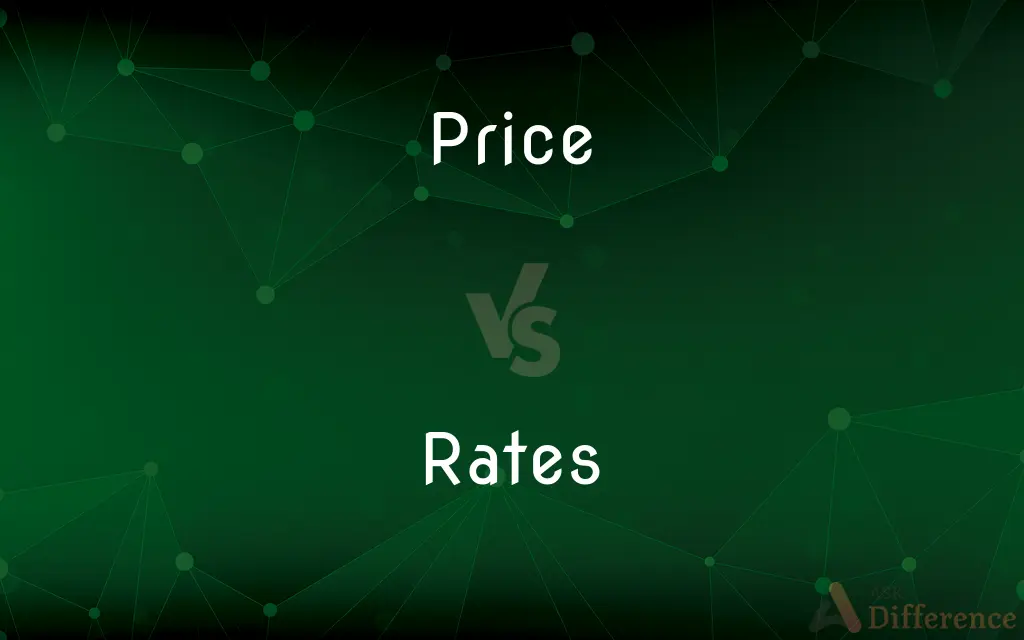Price vs. Rates — What's the Difference?
By Fiza Rafique & Urooj Arif — Updated on March 21, 2024
Price is the cost assigned to a product or service, while rates refer to the cost per unit of service, such as interest rates or hourly wages.

Difference Between Price and Rates
Table of Contents
ADVERTISEMENT
Key Differences
Price is a term commonly used to denote the amount of money needed to purchase a specific product or service. It reflects the value assigned to a tangible or intangible item and is determined by various factors including demand, production costs, and market competition. On the other hand, rates are used to express the cost of services or goods per unit of measurement, like time, distance, or quantity. This term is often applied in contexts such as finance (interest rates), services (hourly rates, rental rates), and utilities (rates for electricity or water per unit consumed).
While prices are usually fixed for a product and known upfront, rates can vary depending on usage, duration, or amount. For example, a product might have a set price tag, but the rate for a service such as legal advice or electrical work may depend on how long the service is required. Furthermore, rates such as interest rates on loans or savings accounts are expressed as percentages, indicating the cost or earnings on money over time, contrasting with the absolute monetary value indicated by prices.
The determination of prices is influenced by factors such as cost of materials, labor, marketing, and desired profit margins. Rates, however, are often determined based on time (e.g., hourly wages, rental rates per day), usage (e.g., utility rates per kilowatt-hour), or risk assessment (e.g., insurance premiums). These distinctions highlight the different applications and considerations in setting prices versus rates.
Understanding the difference between price and rate is crucial in various contexts, especially in financial planning, budgeting, and when choosing between products and services. For instance, comparing the price of purchasing equipment to the rate of leasing it can influence decision-making in business investments. Similarly, consumers might compare the price of a product to the rate of a service to determine the more cost-effective option for their needs.
Both prices and rates play significant roles in the economy, influencing consumer behavior, business strategies, and economic policies. While prices can directly impact the affordability and demand for products, rates can influence borrowing, investment decisions, and overall economic growth.
ADVERTISEMENT
Comparison Chart
Definition
The cost assigned to a product or service.
The cost per unit of service or measurement.
Usage
Used for tangible and intangible items.
Commonly used for services, finance, and utilities.
Variation
Usually fixed and known upfront.
Can vary based on usage, duration, or amount.
Expression
Expressed as an absolute monetary value.
Often expressed as a percentage or per unit.
Determination
Influenced by cost of materials, labor, and profit margins.
Based on time, usage, or risk assessment.
Compare with Definitions
Price
Typically fixed for each unit sold.
The price of a book remains the same regardless of how many are sold.
Rates
Can vary based on different factors such as duration or amount used.
Taxi fares are based on rates per mile and time taken.
Price
Directly affects consumer purchasing decisions and demand.
Lower prices can increase demand and consumption.
Rates
A measure of cost per unit of a service or good.
The interest rate on the savings account is 2% annually.
Price
The amount of money required to purchase a good or service.
The price of the smartphone was $300.
Rates
Influences borrowing, investment decisions, and economic growth.
Lower interest rates can stimulate borrowing and spending.
Price
Determined by production costs, demand, and market competition.
The price of organic vegetables is higher due to increased production costs.
Rates
Determined by usage, time, or risk assessment.
Electricity rates vary depending on consumption levels.
Price
Indicates the cost of acquiring a product or service.
Consumers often compare prices to find the best deal.
Rates
Reflects the cost of usage or service over time.
Consumers look for low rates on loans to save on interest.
Price
A price is the (usually not negative) quantity of payment or compensation given by one party to another in return for one unit of goods or services. In some situation, the price of production has a different name.
Rates
A quantity measured with respect to another measured quantity
A rate of speed of 60 miles an hour.
Price
The amount as of money or goods, asked for or given in exchange for something else.
Rates
A measure of a part with respect to a whole; a proportion
The mortality rate.
A tax rate.
Price
The cost at which something is obtained
Believes that the price of success is hard work.
Rates
The cost per unit of a commodity or service
Postal rates.
Price
The cost of bribing someone
Maintained that every person has a price.
Rates
A charge or payment calculated in relation to a particular sum or quantity
Interest rates.
Price
(Archaic) Value or worth.
Rates
Level of quality.
Price
To fix or establish a price for
Shoes that are priced at sixty dollars.
Rates
Often rates Chiefly British A locally assessed property tax.
Price
To find out the price of
Spent the day pricing dresses.
Rates
To place in a particular class, rank, or grade
Rated the film PG13.
Rated the bonds at junk level.
Price
The cost required to gain possession of something.
Rates
To specify the performance limits of, especially according to a standard scale
This fuse is rated at 50 amperes. The fishing line is rated for 30 pounds.
Price
The cost of an action or deed.
I paid a high price for my folly.
Rates
To regard or consider as having a certain value
Rated the movie excellent.
Rated him a fine cook.
Price
Value; estimation; excellence; worth.
Rates
Chiefly British To value for purposes of taxation.
Price
(transitive) To determine the monetary value of (an item); to put a price on.
Rates
To set a rate for (goods to be shipped).
Price
To pay the price of; to make reparation for.
Rates
(Informal) To merit or deserve
People that rate special treatment.
An idea that rates attention.
Price
To set a price on; to value; to prize.
Rates
To be ranked in a particular class
A wine that rates higher than any other.
Price
To ask the price of.
To price eggs
Rates
(Informal) To have status, importance, or influence
Tea-flavored ice cream doesn't rate highly in my book.
Price
The sum or amount of money at which a thing is valued, or the value which a seller sets on his goods in market; that for which something is bought or sold, or offered for sale; equivalent in money or other means of exchange; current value or rate paid or demanded in market or in barter; cost.
We can afford no more at such a price.
Rates
To berate.
Price
Value; estimation; excellence; worth.
Her price is far above rubies.
New treasures still, of countless price.
Rates
To express reproof.
Price
Reward; recompense; as, the price of industry.
'T is the price of toil,The knave deserves it when he tills the soil.
Rates
Plural of rate
Price
To set a price on; to value. See Prize.
Rates
A local tax on property (usually used in the plural)
Price
To ask the price of; as, to price eggs.
Price
The amount of money needed to purchase something;
The price of gasoline
He got his new car on excellent terms
How much is the damage?
Price
The property of having material worth (often indicated by the amount of money something would bring if sold);
The fluctuating monetary value of gold and silver
He puts a high price on his services
He couldn't calculate the cost of the collection
Price
Value measured by what must be given or done or undergone to obtain something;
The cost in human life was enormous
The price of success is hard work
What price glory?
Price
The high value or worth of something;
Her price is far above rubies
Price
A reward for helping to catch a criminal;
The cattle thief has a price on his head
Price
Cost of bribing someone;
They say that every politician has a price
Price
United States operatic soprano (born 1927)
Price
Determine the price of;
The grocer priced his wares high
Price
Ascertain or learn the price of;
Have you priced personal computers lately?
Common Curiosities
Can both goods and services have rates?
Yes, goods can have rates (e.g., utility consumption), but rates are more commonly associated with services.
How do companies decide on pricing for their products?
Companies consider factors such as production costs, competitor pricing, demand, and desired profit margins to set prices.
What role do market trends play in setting prices?
Market trends can influence prices by affecting supply and demand, where high demand and low supply can lead to higher prices.
How do promotional discounts affect prices?
Promotional discounts temporarily lower the price to stimulate demand or clear inventory, affecting sales and consumer interest.
How do government regulations impact rates and prices?
Regulations can set caps on rates or prices for essential services, influence market competition, and ensure fair pricing practices.
Why are interest rates expressed in percentages?
Percentages allow for a standardized comparison of the cost or earnings on money over time, regardless of the principal amount.
What factors influence rate changes in utilities?
Rate changes can be influenced by resource availability, consumption patterns, regulatory changes, and operational costs.
How does a price differ from a rate in a service context?
Price is the total cost for a service, while the rate may be the cost per hour or per session of that service.
Is the price of a product the same as its value?
The price is what you pay, but value is subjective, based on the perceived benefit and satisfaction derived from the product.
Why might rates vary for the same service among different providers?
Rates can vary due to differences in service quality, expertise, operational costs, and competitive positioning.
Share Your Discovery

Previous Comparison
Went vs. Gone
Next Comparison
Sieve vs. StrainerAuthor Spotlight
Written by
Fiza RafiqueFiza Rafique is a skilled content writer at AskDifference.com, where she meticulously refines and enhances written pieces. Drawing from her vast editorial expertise, Fiza ensures clarity, accuracy, and precision in every article. Passionate about language, she continually seeks to elevate the quality of content for readers worldwide.
Co-written by
Urooj ArifUrooj is a skilled content writer at Ask Difference, known for her exceptional ability to simplify complex topics into engaging and informative content. With a passion for research and a flair for clear, concise writing, she consistently delivers articles that resonate with our diverse audience.















































